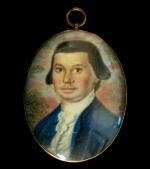![header=[Marker Text] body=[Site of the birthplace of John Morton (1724-1777), signer of the Declaration of Independence. As a delegate to the Continental Congress, his ballot, with that of Franklin, and James Wilson, committed Pennsylvania to the cause of independence by one vote.] sign](http://explorepahistory.com/kora/files/1/10/1-A-15A-139-ExplorePAHistory-a0a8n5-a_450.gif)
Mouse over for marker text
Name:
John Morton
Region:
Philadelphia and its Countryside/Lehigh Valley
County:
Delaware
Marker Location:
420 East Ridley Avenue, Ridley Park, NW of Essington.
Dedication Date:
January 27, 1967
Behind the Marker
Those who called for independence in 1776 were keenly aware of the treasonous nature of their deliberations. During the early years of the American Revolution, Pennsylvanians were deeply divided over whether to join the colonies already calling for independence. When the Pennsylvania delegation at the Second Continental Congress had to vote for or against independence in 1776 its members were deadlocked. One of the nine signers of the Declaration of Independence from Pennsylvania, John Morton cast the decisive ballot that swung his delegation over to an affirmative vote.
Born in 1725 in Ridley Township, in what was then Chester County, Morton learned the professions of surveying and farming from his stepfather. Marrying in his early twenties, he continued to reside in Ridley, where he was active in civic and church affairs, and raised a family of nine children. At the age of thirty, Morton turned his attentions to politics. First elected to the Pennsylvania Assembly in 1756, he sided with the Penn family proprietorship, and served on that body for eighteen terms, while also serving as a Chester County justice of the peace (1757-64 and 1770-74) and as a local sheriff (1766-69).
Morton's service to the nation began in 1765 when he represented Pennsylvania in the Stamp Act Congress in New York. Known initially for his moderate views in the imperial crisis, Morton became wedded to the radical cause as the relationship between England and the colonies worsened. Chosen as a Pennsylvania delegate to the First Continental Congress, Morton was selected again for the Second Congress, where he made his most dramatic act.
On July 2, when Congress called for a vote on the Declaration of Independence, the Pennsylvania delegation struggled with conflicting instructions. While the Assembly instructed the delegation to "dissent from and utterly reject independence," an extra-legal provincial conference called by Philadelphia's radicals approved a preliminary draft of the Declaration and urged the delegates to vote in favor of it.
Now, seated in Congress and bound mainly by conscience, Benjamin Franklin and
Benjamin Franklin and  James Wilson voted for independence, and Thomas Willing and Charles Humphreys voted against it. Since
James Wilson voted for independence, and Thomas Willing and Charles Humphreys voted against it. Since  John Dickinson and
John Dickinson and  Robert Morris were purposely absent, Morton's became the deciding vote. When he joined the side of Franklin and Wilson, the Pennsylvania delegation voted "yea" and Morton forever abandoned whatever moderate views he might have once entertained. Afterwards, his service to Congress included chairing the committee of the whole on the adoption of the Articles of Confederation.
Robert Morris were purposely absent, Morton's became the deciding vote. When he joined the side of Franklin and Wilson, the Pennsylvania delegation voted "yea" and Morton forever abandoned whatever moderate views he might have once entertained. Afterwards, his service to Congress included chairing the committee of the whole on the adoption of the Articles of Confederation.
Within a year of signing the Declaration, Morton became ill and died on his Ridley farm at the age of fifty-one. He is buried at Old St. Paul's Cemetery, Chester, Delaware County.
Born in 1725 in Ridley Township, in what was then Chester County, Morton learned the professions of surveying and farming from his stepfather. Marrying in his early twenties, he continued to reside in Ridley, where he was active in civic and church affairs, and raised a family of nine children. At the age of thirty, Morton turned his attentions to politics. First elected to the Pennsylvania Assembly in 1756, he sided with the Penn family proprietorship, and served on that body for eighteen terms, while also serving as a Chester County justice of the peace (1757-64 and 1770-74) and as a local sheriff (1766-69).
Morton's service to the nation began in 1765 when he represented Pennsylvania in the Stamp Act Congress in New York. Known initially for his moderate views in the imperial crisis, Morton became wedded to the radical cause as the relationship between England and the colonies worsened. Chosen as a Pennsylvania delegate to the First Continental Congress, Morton was selected again for the Second Congress, where he made his most dramatic act.
On July 2, when Congress called for a vote on the Declaration of Independence, the Pennsylvania delegation struggled with conflicting instructions. While the Assembly instructed the delegation to "dissent from and utterly reject independence," an extra-legal provincial conference called by Philadelphia's radicals approved a preliminary draft of the Declaration and urged the delegates to vote in favor of it.
Now, seated in Congress and bound mainly by conscience,
Within a year of signing the Declaration, Morton became ill and died on his Ridley farm at the age of fifty-one. He is buried at Old St. Paul's Cemetery, Chester, Delaware County.





